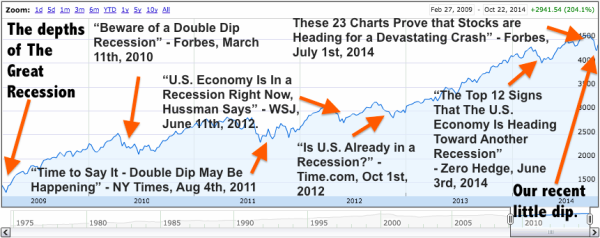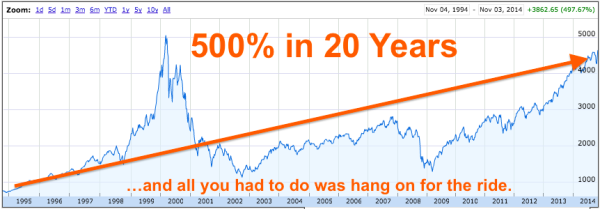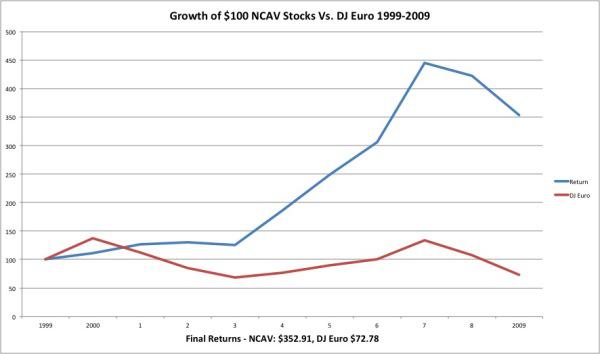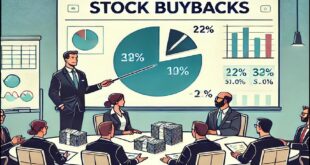Nobody can predict what the stock market will do so basing your investment decision on market or economic predictions is a fool’s game.
The above introductory comments are edited excerpts from an article* by Evan Bleker (netnethunter.com) in a guest post on oldschoolvalue.com entitled Why You Shouldn’t Worry About Market Crash 2015.
While investors face a tsunami of predictions each and every year, most predictions end up being flatly wrong — they just don’t come into fruition. Those journalists, pundits, or publications that do accurately predict a market event are easily remembered but never seem to be able to repeat the feat with any degree of consistency.
Often times big name publications are making doom and gloom predictions at the worst possible times [as is shown in the following graph] so how do I deal with recessions and possible market crashes? The answer is surprisingly simple — I don’t worry about them.

Historical Market Crashes
Here’s the thing: A market crash or recession is guaranteed to happen sometime in the future. I just don’t know when that’s going to be.
Take another look at the performance of the NASDAQ, this time over a period of 20 years:

Nasdaq 20 Year Return
Over the past 20 years the NASDAQ has returned just under 500% despite major market volatility. All an investor had to do to approximate the NASDAQ’s return over that period was to:
- stay as fully invested as possible in a low cost NASDAQ ETF:
- no market predictions were needed,
- you didn’t have to get in and out of the market at the right times, and
- you certainly didn’t have to worry about seeing your portfolio’s value cut in half.
- All you had to do was hang on.
By contrast, basing your investment decisions on predictions found in the financial media would have meant committing financial suicide.
- Over that same time span, you could have easily found yourself out of the market just when stocks were about to takeoff, missing out on great buying opportunities.
- Even worse, liquidating your holdings based on news headlines could have forced you out of significantly undervalued positions at a loss… only to watch those same stocks rise back up to fair value as was the case in the depths of the financial crisis.
In other words, getting out of the market would have caused you to LOSE money…
To deal with the uncertainty of a market crash, I simply:
- fill my portfolio full of stocks of companies with extremely conservative balance sheets and also make sure to
- buy only stocks that are deeply undervalued and
- only buy stocks that don’t need access to the credit markets.
All of this ensures that my investments have the ability to survive deep recessions and that I’m not buying based on unsustainable valuations.
I’m not saying that my portfolio won’t sink during a market crash – I think that’s inevitable – but as long as the values of the companies that I bought are robust, I expect the bulk of my stocks to eventually rise back up to fair value, market crash or not.
Take a look at how European net nets fared despite two major recessions:

European Net Net Stock Investing
In the long run, it is more important to be stocked full of great investment opportunities than it is to worry about getting out before the market plunge. It’s not that hard to spot good opportunities, after all, but it’s nearly impossible to tell what the market will do….
Charlie Munger once said that if you can’t view a drop in the value of your holdings by 50% two or three times a century with equanimity, then you’re unfit for common stock investment and you deserve the mediocre returns that you’re inevitably going to get.
- No matter what your sub-strategy is, profits in common stocks accrue to value investors with a strong temperament and an ability to see things within the context of eternity.
- Don’t stress a 1 or 2 year period of horrible results, those periods are bound to happen no matter what you do, but you can survive them if you’ve invested in financially sound firms.
- A far greater sin is dodging in and out of the market which will ensure terrible results.
Editor’s Note: The author’s views and conclusions in the above article are unaltered and no personal comments have been included to maintain the integrity of the original post. Furthermore, the views, conclusions and any recommendations offered in this article are not to be construed as an endorsement of such by the editor.
*http://www.oldschoolvalue.com/blog/investing-perspective/market-crash-2015/ (©2014 Old School Value. All Rights reserved.)
If you liked this article then “Follow the munKNEE” & get each new post via
- Our Newsletter (sample here)
- Twitter (#munknee)
Related Articles:
1. Most Financial “Experts” Get It Wrong! This Site Grades Their Performance
Recently I discovered a website which tracks pundits in finance (and politics and sports). Check it out to see how many of the calls and predictions of your favorite prognosticators have turned out to be true. You’ll be surprised and, no doubt, disappointed! Read More »
 munKNEE.com Your Key to Making Money
munKNEE.com Your Key to Making Money


